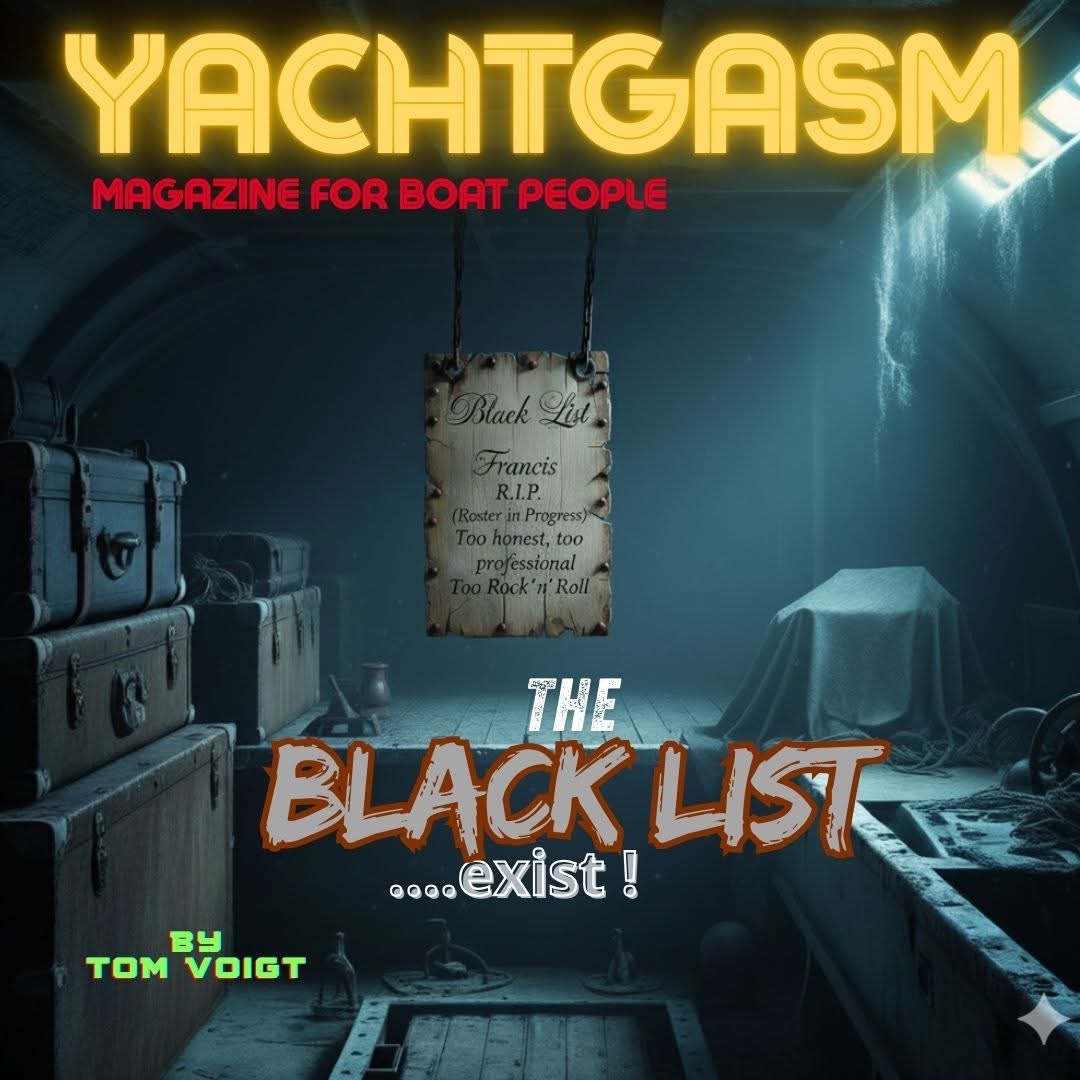The Mystery of the Blacklist

#25/1091.
The Mystery of the Blacklist – A eulogy for Francis – and for everyone who didn’t fit the script.
by Chef Tom Voigt
R.I.P. Francis
In the belly of almost every boat, deep down in a dark bilge, hangs a board. Cracked by brackish seawater, reeking of rot. It sways with the rhythm of the waves, lost in the half-light, among crates, sour wine, and the luggage of crews long gone overboard, never found, never spoken of again. There it dangles: the Blacklist.
Yes, it exists. No myth, no rosy tale from Antibes. Real, rusty, indelible. And as true as McDonald’s food being crap, Francis’s name is on it.
Francis, born in the late sixties. Survivor of his own abortion attempt—his mother tried to get rid of him, no chance. A fighter before he was even human. His father did the rest, beating him through childhood. Until the day Francis turned sixteen. The old man raised his fist again, and Francis hit back. A dry hook, precise like his cooking would later be. Father on the floor, son packed his bag and disappeared.
He landed in a kitchen. In the eighties that meant hard school. A master took him in, a mentor who taught him that cooking was war, that knives weren’t just to be cleaned but sharpened, that timing ruled everything. Francis absorbed it. Twenty years in restaurants followed. Discipline, heat, sweat. Plates leaving the pass like clockwork. No gimmicks, no Instagram towers. Just craft. He loved it. The kitchen was home, ring, battlefield.
And still, something was missing.
In the early nineties he sat in his grandparents’ bar when an old captain with yellow fingers and rum breath spoke to him. “Crossing,” he said. Spain to Antigua. “Need a chef.” Francis barely knew what a crossing was, but he said yes. Weeks later he stood on a 60-meter yacht. VHS instead of Netflix. Dolphins instead of Instagram. Books instead of endless swipe chatter. Cooking, waves, sun. Silence. Freedom and calm, sea, fire, and his craft. Francis knew: this was his place.
Yachting in the nineties was different. People read books, real ones. Crew parties smelled of rum, not detox teas. Gluten-free? Nobody had heard of it. Vegan deckhands? Not even born yet. Instead of smoothie culture, there were real talks, real jokes, real fights. Francis fit in like the drum solo in In the Air Tonight.
He rose quickly. Owners loved him: charming, precise, flawless in front of guests. A butler in a chef’s jacket. Polyglot, five languages, a professional who shone in the cosmopolitan circus without ever begging for approval. Engineers respected him because he had no arrogance. Captains with balls tolerated him.
But the stews? A disaster. For Francis they were chickens. Two courses, a certificate in champagne pouring, and suddenly they thought they were queens of the seven seas. They knew nothing about gastronomy but carried themselves like monarchs. Francis called them backpackers in uniform. And he said it out loud—and laughed.
Too loud.
One day his name was on the blacklist. Not written, not stored. Carved into the belly of the industry. And there it stayed. But Francis didn’t care.
The truth: he was too old, too honest, too much of a pro. In a world that suddenly wanted selfies.
After 2000 the industry got washed out. Captains with smoothie cups. Crews who knew more about iPhone filters than sails. Influencers in uniform. All chasing followers, all dopamine junkies, all traveling the world like snobby tourists. Foreign languages? Cosmopolitan manners? Only left on the cocktail menu.
Francis shook his head and laughed. He was the hybrid analog artisan, and in his fifties already dismissed as a dinosaur. He mastered cooking, he could talk, he could stay silent. He could stand before an owner family like a butler, a gentleman, immaculate. But he couldn’t pretend a broken galley was a “small problem.” He couldn’t smile while the oven in a multimillion-dollar operation went cold.
And that was the problem. On yachts you weren’t allowed to be angry. You had to grin like a sheep. No matter if the kitchen was burning. Francis was no sheep. He was a wolf.
He exploded when the equipment failed. He cursed when the service was off. He laughed bitterly when the galley was patched together again like a bone after its third fracture. That earned him the stamp: Drama.
Drama means unfit. Drama means career over.
The irony: he was no drama. He was a pro. Twenty years in restaurants, discipline, precision. But professionalism in the yacht world is only welcome when it’s sugarcoated. Be too honest and you’re out.
And Francis was out.
Many say the blacklist is a myth. Bullshit. It exists. No paper, no registry. Just calls, whispers, emails. An invisible executioner.
Francis wasn’t alone. Whole generations vanished. Chefs, officers, deckhands. Pros with mortgages, families, children. And suddenly: silence. No calls. No jobs. House gone. Wife gone. Future gone.
The blacklist is a guillotine without blood. Quiet, but deadly.
And where there’s shadow, there’s light. The white list. A secret club of friends and pros, invisible. That’s where the survivors are. Not the best chefs, not the best people. Just the best players. The ones who know when to shut up, when to crawl.
Names on that list get the calls, the superyachts, the contracts. Those not on it can have ten thousand Instagram followers—still ends up cooking pasta on 20-meter wrecks.
Francis was never on the white list. He didn’t play. He lived.
After eighteen years it was over. No more calls. The blacklist had swallowed him. Francis moved north, back into restaurants. Plates instead of Instagram. Guests instead of followers. But the system had left its scars.
Cancer. A long, cruel death.
Francis wrote until the end. Cynical, sharp, merciless. His notes said:
– Yachting isn’t a career ladder. It’s an offshore service job.
– Anyone who thinks they’re climbing is only falling harder.
– After yachting, there’s rarely glory. Just debt, divorce papers, no pension.
He wrote about the pretenders. Stews with certificates and selfie filters who replaced the pros. Captains who needed detox. Crews who collected milk varieties instead of experience.
Francis saw it all coming. He still laughed. But he knew: the blacklist is real.
He wasn’t a victim. He was a symbol. For everyone too honest, too old, too real. For the pros pushed out because the industry would rather book young plastic with Instagram profiles than seasoned craftsmen with gray hair.
The blacklist doesn’t erase names. It makes them immortal. Francis still hangs there, rusty, indelible. A warning. A monument, in some bilge, in the belly of a yacht.
And while up on deck the would-be queens with certificates and follower counts sip their champagne, the truth hangs below, in the dark.
